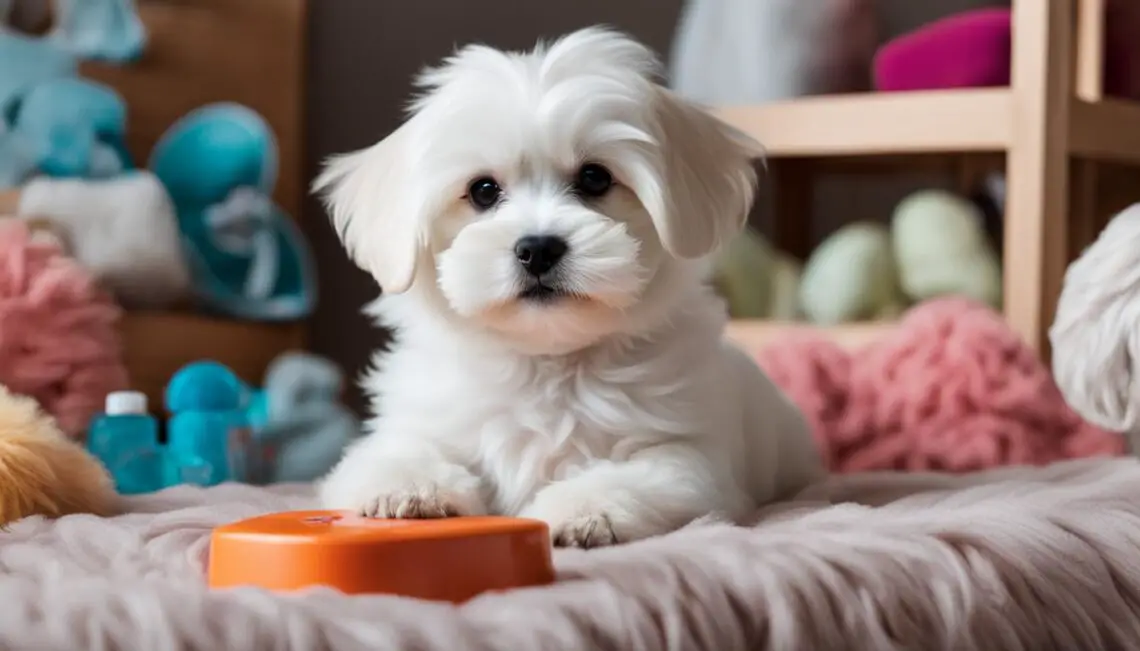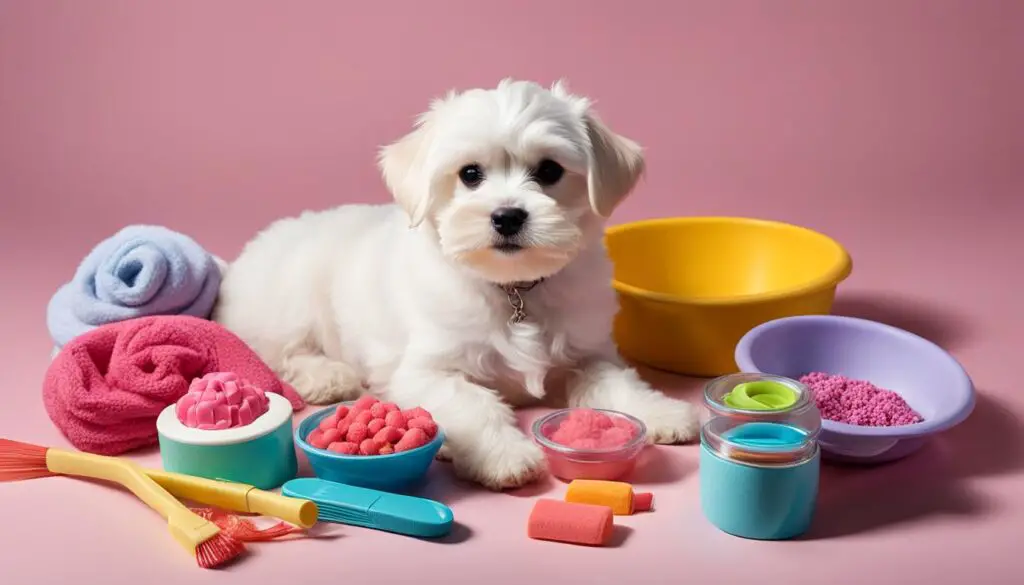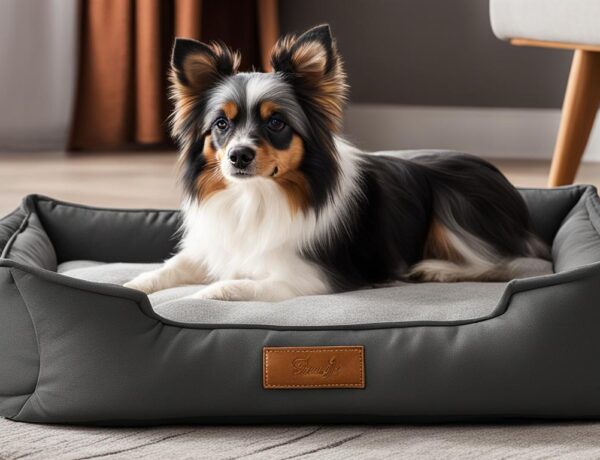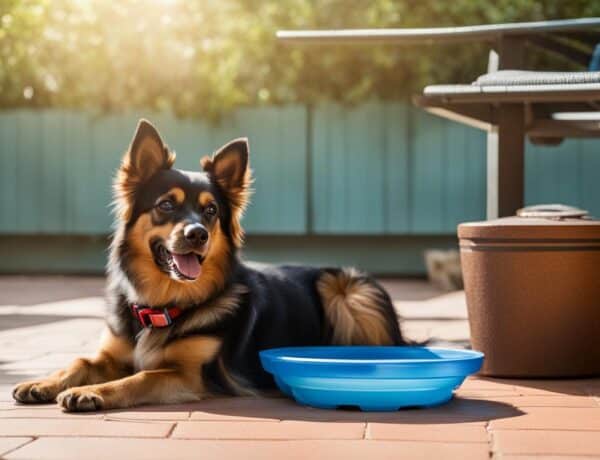Welcome to my guide on preparing for a new Maltese puppy! Bringing home a new furry friend is an exciting time, but it’s important to make sure you’re well-prepared to provide them with the care and attention they need. In this article, I’ll share some helpful tips on how to prepare for your new Maltese puppy’s arrival, set up the right environment, and address their grooming, feeding, exercise, and training needs. Let’s get started!
Key Takeaways:
- Preparing for a new Maltese puppy involves several important elements, including setting up the right environment and addressing their grooming, feeding, exercise, and training needs.
- Maltese puppies have a lot of energy and can be hyper, but they also tire quickly and need plenty of sleep.
- Transitioning a Maltese puppy into their new home can be stressful, so taking steps to make the transition easier is crucial.
- Having all the necessary supplies ready and puppy-proofing the house ensures your Maltese puppy’s safety.
- Consistency, positive reinforcement, and nurturing are key when training and developing a bond with your Maltese puppy.
Setting up the Right Environment for Your Maltese Puppy
When bringing a Maltese puppy into your home, it’s important to create a suitable environment that meets their needs. Having a designated area for your puppy is essential for housebreaking and ensuring their safety. Indoor canine playpens can provide a secure space while minimizing messes.
To ensure your Maltese puppy’s comfort, it’s crucial to choose the right supplies. This includes toys for mental stimulation, pee pads for potty training, and quality food and water bowls. A stainless-steel or ceramic dish is preferred to prevent allergic reactions. Additionally, investing in a dog crate can serve as a safe space for your puppy when you are unable to supervise them closely.
Grooming is an important aspect of caring for a Maltese puppy. Regular grooming not only keeps their coat and skin healthy but also helps them become accustomed to the process. Essential grooming supplies for your Maltese puppy include a brush, shampoo, nail clippers, and grooming wipes. By starting the grooming routine early, your puppy will grow up to tolerate and appreciate these sessions.
A comfortable and supportive dog bed is crucial for your Maltese puppy’s well-being. They need a cozy spot where they can rest and recharge. Selecting a bed that is easy to clean and made of durable materials will ensure it lasts as your puppy grows into adulthood.
| Maltese Puppy Supplies Checklist |
|---|
| Toys |
| Pee pads |
| Food and water bowls |
| Stainless-steel or ceramic dishes |
| Dog crate |
| Treats |
| Brush |
| Shampoo |
| Nail clippers |
| Grooming wipes |
| Comfortable dog bed |
By setting up the right environment with the necessary supplies, a designated play area, and proper grooming tools, you can ensure your Maltese puppy feels safe, comfortable, and well-cared for in their new home.
References:
- Mixson, L. (2021). Maltese Dogs: Complete Owners Manual. Maltese. Maltese dog. Maltese book for care, costs, feeding, grooming, health and training. Maltese Dogs Facts & Information. https://www.amazon.com/Maltese-Dogs-Complete-Owners-Manual/dp/B087D2NMPG
- PetMD. (n.d.). Maltese. https://www.petmd.com/dog/breeds/c_dg_maltese
- American Kennel Club. (n.d.). Maltese. https://www.akc.org/dog-breeds/maltese/
Training and Nurturing Your Maltese Puppy
When it comes to training your Maltese puppy, consistency is key. This sensitive breed responds best to gentle methods, so avoid harsh training techniques. Establishing a schedule for feeding, walking, and training is crucial for their development and proper behavior. By following a consistent routine, you can help your Maltese puppy feel secure and understand what is expected of them.
Nurturing your Maltese puppy is just as important as training. Show them sensitivity and compassion to build a strong bond and create a well-behaved companion. Avoid yelling or physical discipline, as these methods can harm the trust and relationship you are trying to establish. Instead, use positive reinforcement and a firm “no” when needed.
Teaching your Maltese puppy to follow rules and commands should start from the beginning. Be consistent in your expectations, whether it’s not jumping on furniture or not pulling on the leash during walks. By setting boundaries early on, you can shape your puppy’s behavior and prevent future issues.
Regular socialization is essential for a well-adjusted Maltese puppy. Expose them to different environments, people, and animals while providing positive experiences. This will help them develop good manners and reduce the chances of fear or aggression as they grow older. Remember to always supervise these interactions and prioritize your puppy’s safety.
FAQ
How should I prepare for the arrival of my Maltese puppy?
To prepare for your Maltese puppy’s arrival, make sure you have all the necessary supplies, including food and water bowls, a dog bed, leash and collar or harness, and a crate. It’s also important to puppy-proof your house to ensure their safety.
How can I set up the right environment for my Maltese puppy?
Setting up the right environment for your Maltese puppy involves providing them with a designated area, such as an indoor playpen, and ensuring they have the necessary supplies for grooming, feeding, and sleeping. Creating a safe and comfortable space is crucial for their well-being.
How should I address the grooming needs of my Maltese puppy?
Proper grooming is essential for maintaining a healthy coat and skin for your Maltese puppy. You’ll need a brush, shampoo, nail clippers, and grooming wipes to keep them clean and well-groomed. Regular grooming sessions will help prevent matting and keep their coat in good condition.
What is the best way to feed my Maltese puppy?
It’s important to establish a feeding schedule for your Maltese puppy and choose a high-quality dog food appropriate for their age and size. Feeding them small, frequent meals throughout the day is recommended. Consult with your veterinarian for specific feeding guidelines based on your puppy’s needs.
How can I properly exercise my Maltese puppy?
Maltese puppies have a lot of energy but can tire quickly. Regular exercise through short walks, playtime, and mentally stimulating activities is important for their physical and mental well-being. Ensure that the intensity and duration of exercise are suitable for their age and size.
How can I crate train my Maltese puppy?
Crate training can be beneficial for housebreaking and providing a sense of security for your Maltese puppy. Start by introducing them to the crate gradually, making it a positive and comfortable space. Use the crate for short periods initially and gradually increase the duration. Never use the crate as a form of punishment.
What is the best approach to training and nurturing my Maltese puppy?
Consistency, positive reinforcement, and compassion are key in training and nurturing your Maltese puppy. Establish a schedule for feeding, walking, and training, and use rewards and praise to motivate them. Avoid harsh training methods and punishments, as Maltese puppies respond best to gentle guidance and encouragement.
How can I socialize my Maltese puppy?
Socialization is crucial for your Maltese puppy’s development and behavior. Introduce them to new people, animals, and environments gradually and positively. Enroll them in puppy socialization classes and expose them to various stimuli to help them become well-adjusted and polite adult dogs.






No Comments